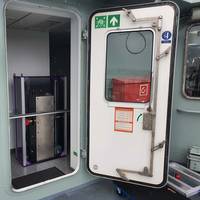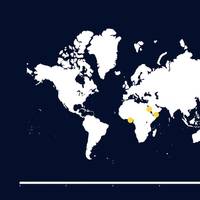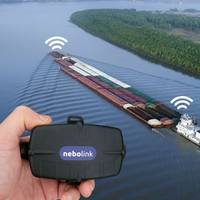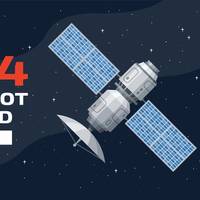Shipping's Tschudi Group Makes Anti-Spoofing Investment

Global maritime shipping faces a surge in GPS and GNSS disruptions — with some regions reporting a 350% increase in affected vessels over the past six months — raising concerns over safety, trade reliability, and security.In response, Tschudi Shipping Company has partnered with U.S.-based Assured Positioning, Navigation, and Timing (APNT) specialist NAL Research and Norwegian maritime technology provider SGM Technology AS to deliver a new resilient navigation and tracking solution…
Quantum Navigation Technology Proven at Sea

Australian quantum software company Q-CTRL has demonstrated its software-ruggedized quantum sensing for navigation technology in a major field trial onboard the Royal Australian Navy’s multi-role aviation training vessel, MV Sycamore.Quantum navigation promises a robust and reliable GPS backup that cannot be jammed or spoofed.Q-CTRL deployed a quantum dual gravimeter, which measures tiny variations in Earth’s gravity as part of a next-generation quantum-assured positioning, navigation and timing (PNT) system operable when GPS is unavailable or untrusted.In quantum gravimetric navigation…
Geopolitical Conflicts Highlight a Ship's Need for "Digital Eyes"

Yarden Gross, CEO and Co-founder of maritime technology company Orca AI, reflects on the recent tanker collision in the Strait of Hormuz, arguing that as GPS interference becomes more common, ships urgently need AI-based situational awareness to support crews and maintain safe navigation when traditional tools are compromised.The recent collision between the tankers Front Eagle and the Adalynn in the Strait of Hormuz is more than a tragic incident – it’s a stark warning to the maritime industry.
Oil tanker Near Iran Experiences Signal Jamming

The Front Tyne oil tanker was sailing through the Gulf between Iran and the United Arab Emirates on Sunday when just past 9:40 a.m. shiptracking data appeared to show the massive vessel in Russia, in fields better known for barley and sugar beets.By 4:15 p.m., the ship's erratic signals indicated it was in southern Iran near the town of Bidkhun, before later placing it back and forth across the Gulf.Mass interference since the start of the conflict between Israel and Iran has affected nearly 1…
Quantum Sensing Beats GPS-Denied Navigational Challenges

The same error-prone sensitivity that has slowed down the development of quantum computers is being turned into an advantage for GPS-denied navigation.A new quantum sensing technology from Australia-based Q-CTRL has most recently caught the interest of Lockheed Martin and the US Defense Innovation Unit, but the company is already working with the Australian Department of Defence, the UK Royal Navy, the US Department of Defense and Airbus.These agencies are interested in a quantum-sensing-based navigation system…
Windward Tracks Change to GPS Jamming Hotspots

Winward’s latest report, focused on Q1 2025, indicates a major change in how vessels experiencing GPS jamming are appearing on tracking maps.The average distance vessels “jump” to when their AIS is jammed grew from 600km in Q4 2024 to 6,300km in Q1 2025. “This distance completely disrupts trade and safety measures at sea, making it nearly impossible to track vessels within any realistic or relevant geographical vicinity,” says Windward.“The main GPS jamming patterns we saw in Q4 were dense areas and smaller circles.
High Frequency Tracking System Developed for Workboat Fleets

Nebo Global is launching its NeboFleet tracking solution for workboat fleets at the International Workboat Show, November 12, 2024.Already in operation with selected businesses in the United States and Australia, NeboFleet provides fleet managers and operational staff with a clear view of fleet and vessel status and an accurate track of where each vessel has been.Nebo Fleet is accessed via a secure online portal and app, with a self-contained, waterproof GPS tracker installed on each vessel.
Meet ‘Super GPS’: XONA Ups the Space Race Ante

With a mission to power the current and next-generation of GPS-enabled products and systems, XONA Space Systems keeps the mantra ‘precision, power and protection’ in all that it does as this 2020-start-up designs, builds and launches its fleet of low earth orbit satellites. We spoke with XONA CEO Brian Manning for his insights on how this could impact the maritime, offshore energy and subsea sectors.The following was excerpted from Maritime Reporter TV’s interview with XONA CEO Brian Manning.
Shed the Satellite: Quantum Sensors hold Promise for Future GPS-Free Navigation

Don’t let the titanium metal walls or the sapphire windows fool you. It’s what’s on the inside of this small, curious device that could someday kick off a new era of navigation.For more than a year, the avocado-sized vacuum chamber has contained a cloud of atoms at the right conditions for precise navigational measurements. It is the first device that is small, energy-efficient and reliable enough to potentially move quantum sensors — sensors that use quantum mechanics to outperform conventional technologies — from the lab into commercial use…
GPS Unreliability

The Global Positioning System (GPS) has become vital to the maritime community. Proper use of properly functioning equipment can allow ships to safely navigate worldwide. It’s signals are now integrated into a variety of shipboard items, including the automatic identification system (AIS) and the electronic chart display and information system (ECDIS). It has been copied by Russia’s GLONASS, Europe’s GALILEO, China’s BeiDou, India’s IRNSS, and Japan’s QZSS. Originally developed for the US Navy for ship positioning and navigation…
Maritime GPS Users, Remember 6 April 2019
Maritime users of the Global Positioning System Standard Positioning Service (GPS-SPS) are urged to check their systems ahead of the week counter roll over on 6 April 2019, informed International Maritime Organization (IMO).Some outdated GPS receiver systems may cease to function properly - with potentially serious impacts on navigation, the UN body pointed out.The roll over occurs because the GPS system transmits time to GPS receivers using a format of time and weeks as a 10-bit value, which started from 6 January 1980, and can only count 1023 weeks.The previous roll over was on 21 August 1999, when systems reset and began counting towards week 1023 again.
GPS Rollover April 6, 2019: Are you ready?

Maritime users of the Global Positioning System Standard Positioning Service (GPS-SPS) are urged to check their systems ahead of the week counter roll over on 6 April 2019. Some outdated GPS receiver systems may cease to function properly - with potentially serious impacts on navigation.The roll over occurs because the GPS system transmits time to GPS receivers using a format of time and weeks as a 10-bit value, which started from 6 January 1980, and can only count 1023 weeks. The previous roll over was on 21 August 1999, when systems reset and began counting towards week 1023 again.








